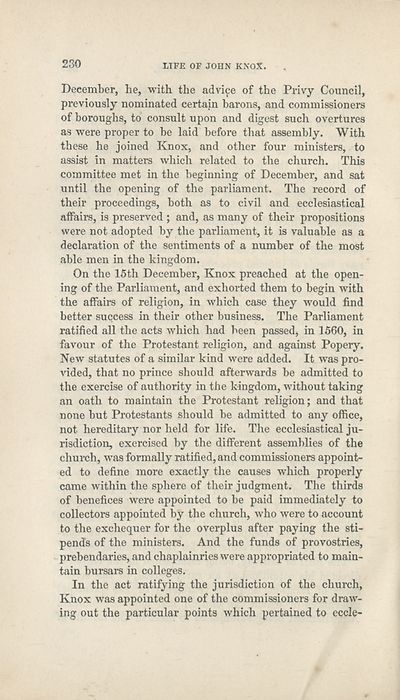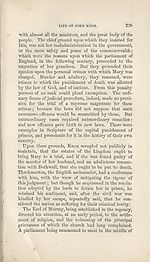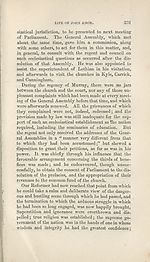Download files
Complete book:
Individual page:
Thumbnail gallery: Grid view | List view

230
LIFE OF JOHN KNOX.
December, he, with the advice of the Privy Council,
previously nominated certain barons, and commissioners
of boroughs, to consult upon and digest such overtures
as were proper to be laid before that assembly. With
these he joined Knox, and other four ministers, to
assist in matters which related to the church. This
committee met in the beginning of December, and sat
until the opening of the parliament. The record of
their proceedings, both as to civil and ecclesiastical
affairs, is preserved ; and, as many of their propositions
were not adopted by the parliament, it is valuable as a
declaration of the sentiments of a number of the most
able men in the kingdom.
On the 15th December, Knox preached at the open¬
ing of the Parliament, and exhorted them to begin with
the affairs of religion, in which case they would find
better success in their other business. The Parliament
ratified all the acts which had been passed, in 1560, in
favour of the Protestant religion, and against Popery.
New statutes of a similar kind were added. It was pro¬
vided, that no prince should afterwards be admitted to
the exercise of authority in the kingdom, without taking
an oath to maintain the Protestant religion; and that
none but Protestants should be admitted to any office,
not hereditary nor held for life. The ecclesiastical ju¬
risdiction, exercised by the different assemblies of the
church, was formally ratified, and commissioners appoint¬
ed to define more exactly the causes which properly
came within the sphere of their judgment. The thirds
of benefices were appointed to be paid immediately to
collectors appointed by the church, who were to account
to the exchequer for the overplus after paying the sti¬
pends of the ministers. And the funds of provostries,
prebendaries, and chaplainries were appropriated to main¬
tain bursars in colleges.
In the act ratifying the jurisdiction of the church,
Knox was appointed one of the commissioners for draw¬
ing out the particular points which pertained to eccle-
LIFE OF JOHN KNOX.
December, he, with the advice of the Privy Council,
previously nominated certain barons, and commissioners
of boroughs, to consult upon and digest such overtures
as were proper to be laid before that assembly. With
these he joined Knox, and other four ministers, to
assist in matters which related to the church. This
committee met in the beginning of December, and sat
until the opening of the parliament. The record of
their proceedings, both as to civil and ecclesiastical
affairs, is preserved ; and, as many of their propositions
were not adopted by the parliament, it is valuable as a
declaration of the sentiments of a number of the most
able men in the kingdom.
On the 15th December, Knox preached at the open¬
ing of the Parliament, and exhorted them to begin with
the affairs of religion, in which case they would find
better success in their other business. The Parliament
ratified all the acts which had been passed, in 1560, in
favour of the Protestant religion, and against Popery.
New statutes of a similar kind were added. It was pro¬
vided, that no prince should afterwards be admitted to
the exercise of authority in the kingdom, without taking
an oath to maintain the Protestant religion; and that
none but Protestants should be admitted to any office,
not hereditary nor held for life. The ecclesiastical ju¬
risdiction, exercised by the different assemblies of the
church, was formally ratified, and commissioners appoint¬
ed to define more exactly the causes which properly
came within the sphere of their judgment. The thirds
of benefices were appointed to be paid immediately to
collectors appointed by the church, who were to account
to the exchequer for the overplus after paying the sti¬
pends of the ministers. And the funds of provostries,
prebendaries, and chaplainries were appropriated to main¬
tain bursars in colleges.
In the act ratifying the jurisdiction of the church,
Knox was appointed one of the commissioners for draw¬
ing out the particular points which pertained to eccle-
Set display mode to:
![]() Universal Viewer |
Universal Viewer | ![]() Mirador |
Large image | Transcription
Mirador |
Large image | Transcription
| Antiquarian books of Scotland > Scotland/Scots > Life of John Knox ; and, The life of Alexander Henderson > (248) |
|---|
| Permanent URL | https://digital.nls.uk/131835280 |
|---|
| Description | Thousands of printed books from the Antiquarian Books of Scotland collection which dates from 1641 to the 1980s. The collection consists of 14,800 books which were published in Scotland or have a Scottish connection, e.g. through the author, printer or owner. Subjects covered include sport, education, diseases, adventure, occupations, Jacobites, politics and religion. Among the 29 languages represented are English, Gaelic, Italian, French, Russian and Swedish. |
|---|

